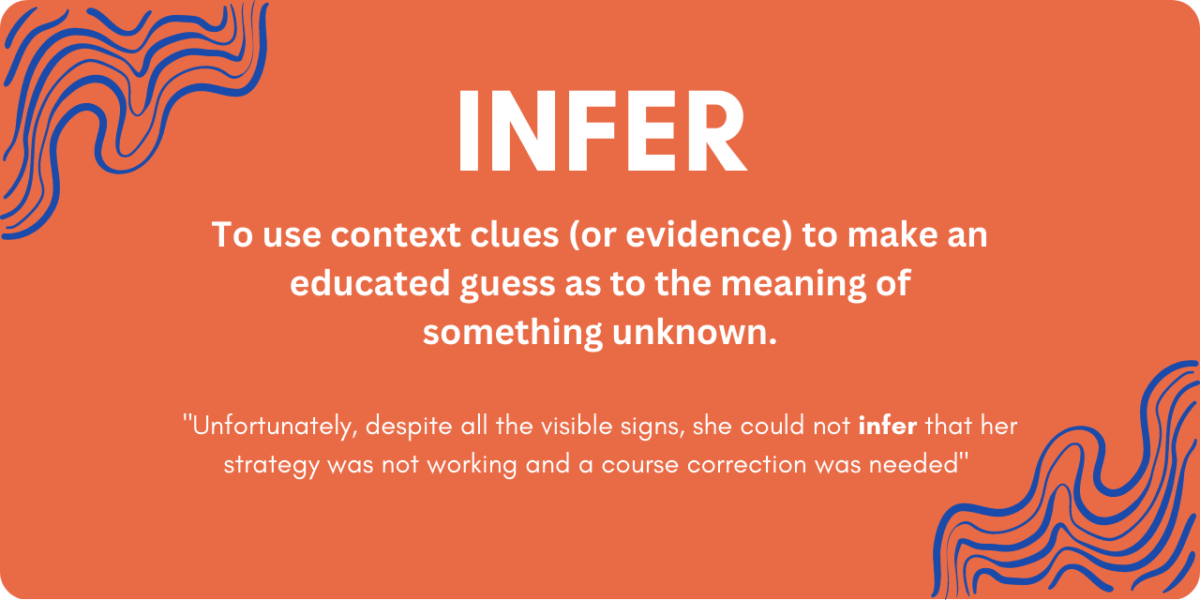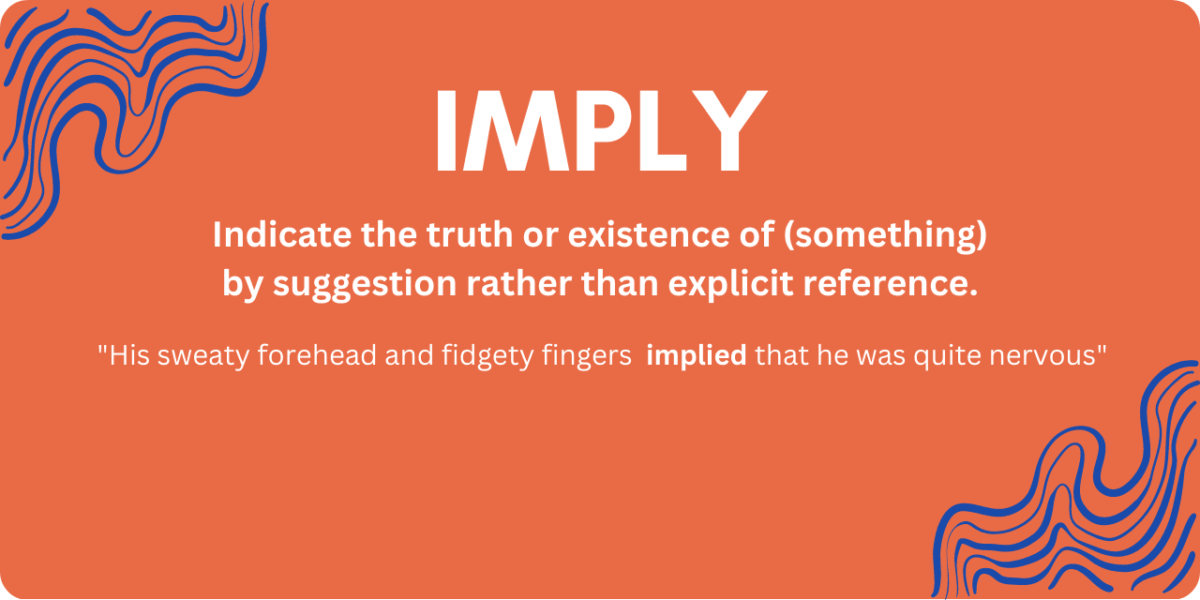Let’s have a close look at infer vs. imply. Is there a difference, and how do we use them? Here is the short answer:
- When you infer, you are using context clues to make an educated guess about the meaning of something.
- On the other hand, imply means that something or someone is suggesting something indirectly (without actually saying it).
- The noun form of imply is implication, and for infer, it is inference.
Now let’s get under the hood.
The English language is a maze full of unexpected twists and turns that can make vocabulary and grammar challenging to learn or understand, especially for non-native speakers.
English borrows liberally from many languages, and often the root of confusion involves including foreign words and their irregular rules. In other cases, it is a matter of widespread incorrect usage or because two words are similar enough that users confuse their meanings.
The words “infer” and “imply” are likely misused because they are not generally part of everyday speech and are both short words with similar beginnings. However, the truth is that their meanings are nearly opposite to one another!
The Meaning of Infer

To understand the meaning of infer, think about how detectives work. When trying to solve a crime, they must first locate and consider all available evidence. Once they have the clues, they try to make connections to understand who committed the crime, where and when it took place, how it happened, and the motive behind the act.
This method is the root behind the meaning of the word infer, which means to use context clues (or evidence) to make an educated guess as to the meaning of something unknown. When detectives infer, they put together facts to come up with new leads for their investigation so they can find the truth behind what took place.
In both writing and communication, sometimes there are hidden meanings that people may miss if they are not paying close attention or have not developed the ability to infer.
This phenomenon is especially true in poetry, where poets use figurative language techniques such as personification, metaphors, and symbolism to turn a straightforward idea into something complex with different meanings for the reader to discover. Putting together the poet’s hidden clues within a poem can reveal that the oncoming train speeding along a railroad may be a metaphor for the impending arrival of death!
The ability to infer to “read between the lines” in writing and conversation is a skill like any other, which means it can be developed and improved with practice or proper instruction. Nonetheless, here are some examples of appropriate usage for the word itself:
- Alfred could not infer that no one would sit with him at lunch because of his excessive body odor; otherwise, he might have taken a shower.
Poor, smelly Alfred is missing that crucial skill here, the ability to put together the puzzle pieces to see the complete picture. He knows that people avoid him but cannot figure out why.
- Denise did not get angry when Paul teased her; she saw how he sometimes looked at her when he thought she wasn’t looking and inferred that he had a crush on her.
Unlike Alfred, Denise is a bit more perceptive. She has put two and two together and realizes that Paul is not trying to be mean to her; he is just seeking her attention. Note that inferred is just the past tense conjugation of the infinitive “to infer.” The verb form will change based on person (1st, 2nd, 3rd) and tense.
Synonyms for Infer:
Here are some synonyms to better understand infer:
Deduce
He was about to deduce that the team was not happy with the direction of the project.
Work out
After some thought, she worked out their plan and was able to act.
Conclude
Upon closer inspection of all the fact, the team leader concluded that their strategy was not working
The Meaning of Imply

While imply has a nearly opposite meaning, there is a definite connection between it and the verb infer. If you imply something, intentionally or unintentionally, there is a hidden meaning for anyone who can recognize the clues and piece it together (infer), like the poet’s train example from above.
Here is an example sentence to make it easier to understand how this idea works:
- As Erica swallowed the last bite of her dinner, PollyAnna looked at her with disgust and slid her napkin across the table toward her.
Not a word passes between the two, but PollyAnna implies that Erica needs the napkin. Her actions and expression speak for her in this case, but we must infer to understand why. There are a few clues here to help us along the way.
First, we know that it is dinner time, and Erica is eating. The item in question is a napkin, usually used at dinner to wipe your mouth or clean up a mess. These clues, coupled with PollyAnna’s expression, would indicate that Erica has food all over her face or hands, and her sister wants her to clean up.
Note that if something is implied, it is an indirect reference. PollyAnna does not come out and say this, and if Erica does not pick up on those clues, she may ask, “What is this for?” For which her sister might reply, with some exasperation, “Your face, stupid.”
Of course, this is pure speculation.
Enjoy the following examples to help you understand how to use imply in writing. Remember that the root word changes form when conjugated for tense:
- When Mom asked what happened to the cookie jar, Blake implied that Bobby-Joe should keep his fat mouth shut with a murderous look, but the fool started talking anyway; they were both grounded.
- When the detective asked her to come to the station for an interview, the widow shrieked, “Are you implying that I had something to do with Abner’s murder?”
Alternate Forms of the Two Words
While we mentioned that the verb form could look a little different depending on the subject and tense of the sentence, the variation is more drastic when each word appears in the noun form.
Infer becomes “inference,” and imply becomes “implication.” However, the meaning is still the same. They are just different parts of speech; since that form is a noun, the words will now take an article (a, an, or the).
- “Julie, I’m relieved to see you! I thought my implication in my presentation about meeting here might have been too vague for you to make the inference, but I couldn’t risk the others catching on.”
It looks like the two managed to pull off a covert meeting in front of an audience, with the speaker leaving indirect hints that only her accomplice would recognize for Julie, which the latter was able to pick up and piece together to infer the time and place for their clandestine liaison.
Examples from Media Sources:
Let’s look a few examples of how both words are used by reputable media publications:
The Resolution Foundation avoids sketching out what the human implications of this consumer credit crunch might be, but they’re not hard to infer: red-letter bills, forced sales of homes, and a rise in repossessions.
Science Magazine:
Our findings imply that conifer trees survived in ice-free refugia of Scandinavia during the last glaciation, challenging current views on survival and spread of trees as a response to climate changes.
Further reading: Cavalry vs. Calvary






